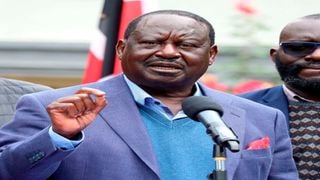
Azimio la Umoja One Kenya leader Raila Odinga addresses journalists at the Stephen Kalonzo Command Centre in Nairobi on July 4.
| File | Nation Media GroupWeekend
Premium
When greatness flickered: Is end of protests sign of Raila’s waning popularity?
“I am no prophet — and here’s no great matter; I have seen the moment of my greatness flicker,” so wrote T.S Eliot in his poem, “The Love Song of J. Alfred Prufrock”.
For three days, from Wednesday July 19 to Friday, July 21, 2023, former Prime Minister Raila Odinga saw the moment of his greatness flicker as he called for protests.
For years, sombre-looking and distant, like a film star — an enigmatic fantasy figure — defiant and with affirmed aplomb, he has faced presidents in sometimes deadly confrontations.
During the recent protests, Mr Odinga was like a man abandoned by the mystery of the enigma that surrounds him — suddenly seemingly alone and vulnerable. The protests held much promise as they started like a sky babbling with a thunderstorm.
The protesters burnt tyres as if the roaring flames were their revenge on the rising cost of life. Far away, up above the commotion, the sky was blue, with fog slipping away like a skin skimmed from milk.
And maybe, far away also (as Mr Odinga was rumoured to be recuperating at the Coast and didn’t participate in the protests he had called), maybe he reflected about what the protests had achieved.
As the protests raged, the nation was silently contemplating and so much hung suspended within that pregnant pause of time, hanging in the electrically tense air between Mr Odinga’s supporters and the police: what he had to lose, what he had to gain, the price he had already paid and what he still had to pay.
His escalating feud with President Ruto had shaken the country into a do or die scenario. But the protests were met with determined government force, and they somehow fizzled out in the face of withering teargas and ricocheting gunfire.
In the mist of tear gas smoke, the protesters looked like silhouettes, far away, ready to be transported to the dark side — under a cloud of delicious dark thrill.
Maybe Mr Odinga is no longer as energetic as he was or maybe he is. However, old age, it has been said, is a time of losses — permanent, cumulative, and irreversible — tinged with a certain finality and often with a dash of regret, nostalgia, and alienation.
Mr Odinga now looks like a man who has grown less and less sure of his spoils along the way. Like a man singing about the longing to reach a distant shore no longer unattainable.
Maybe he is exhausted, trying to reckon with the costs and opportunities of the unique clarion call to serve his generation. At the beginning, he may have thought that he could have it all. Not anymore. Though he is the scion of Kenyan opposition politics, the presidency has always been somehow elusive. And this loss is the most grievous.
He reminds one of several characters in literature who had to grapple with loss in one form or another.
In Shakespeare’s Hamlet, the character Hamlet, after the death of his father, says pessimistically: “How weary, stale, flat, and unprofitable / Seem to me all the uses of this world!”. Hamlet is unable to overcome his grief and from then on, he allows his sorrow to paint everything with emptiness.
Also Read: Ruto-Raila talks - The moment of truth
Another literary character Mr Odinga compares with is Dorothy from The Wonderful Wizard of Oz by Frank Baum. Like Dorothy, one moving toward an unknown destination impelled by some kind of energy, Mr Odinga, since joining politics on a day full of promise, had embarked on an uncertain journey to an unknown destination.
And like Dorothy, he encountered obstacles along the way and many turning points. Essentially alone, just like Dorothy, he was on a quest to a vague promised land. The destination didn’t turn out as Mr Odinga imagined (just like in Dorothy’s case).
Thwarted in their desires, at the end of the journey, having not reached their destinations, both Dorothy and Mr Odinga return “home” but completely transformed by the journey. His destiny that had seemed to him like an Eden sweet with birdsong had fallen short.
Mr Odinga will most likely rise again. He always, somehow, does. However, the failed protests could also mean that his journey is still incomplete. He has not yet achieved what he is fighting for even though there are a myriad of questions.
What regrets does Mr Odinga have? Does he ever cry for what is lost? Like the narrator in the elegy “Tears, Idle Tears,” by Alfred Tennyson who says, “Tears, idle tears/ I know not what they mean/ Tears from the depth of some divine despair rise in the heart/ and gather to the eyes/ On looking on the happy autumn fields/ And thinking of the days that are no more”.
His supporters must be wondering if the accumulation of years of losses have led to a shrinkage of the hopes and ambitions he had. Or whether his dreams are now abandoned. Does Mr Odinga think of the days that are no more? Of doors he never opened?
- [email protected]. The writer is a book publisher based in Nairobi.





